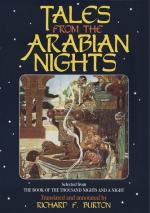The present story combines the features of the anti-Jewish tales, the Alaeddin series, and the Grateful Beasts series. (Compare Mr. W. A. Clouston’s remarks on Aladdin, Supp. Nights, App. iii., pp. 371-389; and also his “Tales and Popular Fictions.”)
In vol. 53 of the Journal of the Asiatic Society of Bengal (1884, pp. 24-39) I find a Nicobar story which relates how Tiomberombi received a magic mirror from a snake whose enemy he had killed. Its slaves obeyed all his orders if he only put the key into the keyhole, but he was not allowed to open the mirror, as he was too weak to face the spirits openly. He dwelt on an island, but when a hostile fleet came against him, the gunners could not hit it, as the island became invisible. The hostile chief sent an old woman to worm the secret out of Tiomberombi’s wife; the mirror was stolen, and Tiomberombi and his wife were carried off. On reaching land, Tiomberombi was thrown into prison, but he persuaded the rats to fetch him the mirror.[FN#644] He destroyed his enemies, went home, and re-established himself on his island, warning his wife and mother not to repeat what had happened, lest the island should sink. They told the story while he was eating; the island sank into the sea, and they were all drowned.
The History of Abu Niyyah and
Abu Niyyatayn (pp.
264-279).
This story combines features which we find separately in Nos. 3b (ba); 162 and 198. The first story, the Envier and the Envied, is very common in folk-lore, and has been sometimes used in modern fairy-tales. The reader will remember the Tailor and the Shoemaker in Hans Christian Andersen’s “Eventyr.” Frequently, as in the latter story, the good man, instead of being thrown into a well, is blinded by the villain, and abandoned in a forest, where he afterwards recovers his sight. One of the most curious forms of this story is the Samoghitian
Truth and Injustice.[FN#645]
Truth and Injustice lived in the same country, and one day they happened to meet, and agreed to be friends. But as Injustice brought many people into trouble, Truth declared that she would have no more to do with her, upon which Injustice grew angry, and put out the eyes of Truth. Truth wandered about for a long time at random, and at last she came to a walnut-tree, and climbed up it to rest awhile in safety from wild beasts. During the night a wolf and a mouse came to the foot of the tree, and held the following conversation. The wolf began, “I am very comfortable in the land where I am now living, for there are so many blind people there that I can steal almost any animal I like without anybody seeing me. If the blind men knew that they had only to rub their eyes with the moss which grows on the stones here in order to recover their sight, I should soon get on badly with them.”
The mouse responded, “I live in a district where the people have no water, and are obliged to fetch it from a great distance. When they are away from home I can enjoy as much of their provisions as I like; indeed, I can heap together as large a store as I please without being disturbed. If the people knew that they had only to cut down a great oak tree and a great lime tree which grow near their houses, in order to find water, I should soon be badly off.”




